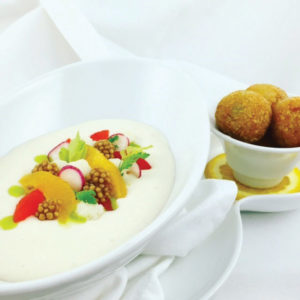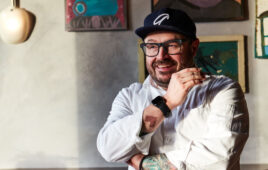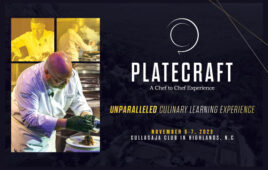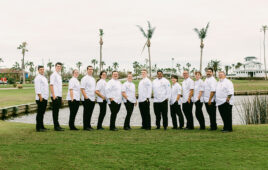
Left to right: Tyler Field, CEC, CCA, Executive Chef; Carmen Mauceri, General Manager/Chief Operating Officer; Stephen Bush, CEC, Banquet Chef; Chris Fragola, CEC, Beach Club Executive Chef; James Tuckey, CEC, Chef de Cuisine; and Zak Brzytwa, Director of Food & Beverage
The F&B team at The Club at Mediterra, with no fewer than four certified culinary professionals as well as a General Manager who was previously an Executive Chef, has come together for seamless and never-ending pursuit of a singular goal: providing great service and food for the membership.
In many clubs’ food-and-beverage operations, tensions can arise at any time among members of the management team, simply because of the stressful nature of our day-to-day existence. Unlike in a public restaurant or hotel, as club managers and chefs we never say no to reasonable requests, and our business periods are always unpredictable, in a way that leads to multiple daily surprises.
From a chef’s standpoint, after 15 years at a club, I have learned when to be sensitive to “the messenger” who has to convey the news about the inevitable pop-up event or a significant last-minute headcount change. I’ve come to realize that they are just doing their job, and that I would have handled it exactly the same way had I been in their shoes.
It’s a cop-out for club chefs to express anger or frustration when something comes up that wasn’t in their daily plan. That’s easy to do. What’s difficult is coming together, no matter what arises, to still exceed the expectations of a member or client while performing some magical act for them that they will then tell all of their friends about.
Having everyone on the F&B team on the same page, with each person always showing mutual respect for the others’ roles, is critical to maintaining an exemplary club operation. And that usually starts at the top, with a group of mature professionals.
There’s perhaps no better example of this in the club industry than the management team and culinary staff at The Club at Mediterra in Naples, Fla., where GM/COO Carmen Mauceri and his team are engaged in a never-ending, always-passionate pursuit to provide great service and food for the membership. Mediterra’s team has the distinction of not only someone at the top with a culinary background (Mauceri was the Executive Chef at The Country Club in Pepper Pike, Ohio earlier in his career), but also no fewer than four certified culinary professionals.
While we have previously profiled Executive Chef Tyler Field in a “Chef to Chef” interview (“Reaching Higher Ground,” C&RB, December 2014), we decided to return to Mediterra for a special-format interview this month, with each member of the team providing answers that collectively provide insight into how all of these accomplished professionals work together to reach the ultimate goals for their club.
To GM/COO Carmen Mauceri: Given your culinary background, you are not the typical GM when talking strategy with Chef Tyler and his team. What have you found to be the best situations for offering input, in order to make the member experience at Mediterra even better?
Mauceri: My input is somewhat more situational and strategic, versus day-to-day input. But as you certainly know, while you can take the cook out of the kitchen, you can’t take the kitchen out of the cook! I certainly relish the opportunity to help bridge the gap between classically trained, thought-provoking culinarians and the connections our members have with food and dining.
A chef grows and goes through stages in his or her culinary career. Looking back to when I was an executive chef, my culinary signature certainly changed throughout the years of practice.
With my experience and intimate knowledge of front-of-house partnerships and strategy, I believe that if you articulate a vision to the team and encourage them to do the same with their reports, a paradigm is created through this melding of experience and sharing of knowledge.
Mediterra is not a micro-managed property. I afford the team every opportunity and expect them to be creative in finding solutions to some of the daily challenges we all face when it comes to hospitality and food-and-beverage operations in a private club. We provide the creative room needed to achieve the pillars of excellence we have designed.
I believe that has been a large contributing factor to the success of the culinary operation at Mediterra. Some other properties are so rigid in what they want their chefs to say, do or prepare—but I think that inhibits their performance, instead of accelerating it.
To Director of Food & Beverage Zak Brzytwa: You are the connection between the front and heart of the house. What are some of the challenges you’ve faced in your role of pulling things together, and examples of the solutions that you’ve provided in those situations?
Brzytwa: We have come to refer to the front of the house as the “soul”; together with the culinary team, we are the “heart and soul” of the clubhouse. Our priority is to provide the best dining experience for the membership and their guests by pooling our collective knowledge, experience and creativity. We are united in that daily effort.
Therefore, we must first have a strong foundation of knowledge in place. Our team is educated, certified and accomplished. Building on that foundation, we consider communication and preparation paramount to our success.
The challenges inherent in a private club with multiple dining options, kitchens and venues are potentially endless. Members could have food allergies, preferences or special occasions to consider. A la carte could be running alongside an event, or even more than one event. We also cater in members’ homes and privately on campus. Without an organized, efficient, consistent and united front based on preparation and communication, we could not enjoy the many successes that we do.
We prepare for flawless execution through our many creative processes. Our “Touch Board,” for example, maps out every table in the club like a giant floor plan. It is updated throughout the day and it lets everyone in the club, from the GM to the hostess, know who is coming in that night, while also highlighting special occasions, allergies, preferences, and anything else that might be relevant.
We also have what we refer to as the “Roadmap to Excellence,” which details staffing, tasks to be accomplished throughout the day or week, and the events and expectations for every room in the club and in members’ homes.
Providing the entire team with a blueprint for success allows us to spend time communicating the finer details of what we need to accomplish and deliver a more refined experience. It provides room for creative thinking, and keeps us focused on the keys to our success.
To Executive Chef Tyler Field: As Executive Chef, you’ve assembled a team of accomplished professionals, many of whom are Certified Executive Chefs and ACF competitors who drive themselves for excellence on a daily basis. What would you say is the key to building a team and creating an environment where all of the chefs motivate one another?
Field: Building and retaining a well-trained staff is becoming more and more challenging, but I think keeping your standards very high, and never sacrificing those standards, sets the tone for a superlative kitchen. Only accepting the exceptional defines the expectation and sets the goal for every position in the kitchen. At Mediterra, having sous chefs who act like owners makes it all possible.
We pride ourselves on being a club that invests in education at all levels. We recruit heavily from culinary schools around the country and have a very demonstrative training process. I personally look for the right combination of attitude, humility, manners and internal drive. And if they are a decent cook, that’s a bonus. This season, 50 percent of our staff is made up of interns, and it’s our goal to prepare them for any other scratch kitchen in the industry upon leaving.
Understanding each cook’s individual growth and aspirations in the kitchen is very important. I ask everyone to write their professional and personal goals so that I can mentor and assist each person in accomplishing them, and also suggest new ones. I keep challenging myself and the team in different ways. We use those opportunities to educate and include everyone on the team.
Trust is a big factor in motivation here. We trust each other and openly share any challenges we are having, personal and professional, without fear of judgment. This allows us to be open and honest about everyone’s ideas, food and procedures. Being able to give specific details lets us really dial in on the best possible outcomes. We don’t always see eye to eye, but we move forward as a team and commit to doing things in the best possible way, no matter the difficulty.
The biggest reward for me these days is the success of my team, past and present, and the individual accomplishments of those who are on it. We share so many highs, lows and laughs, it’s impossible to not think of these people as family. They are my motivation.
We are extremely proud of the processes we’ve cultivated over the years. Adhering to those practices has developed a culture of growth, sponsorship and development, resulting in a collaborative team of many talented chefs under one roof. When you have four certified executive chefs all aligned to the same vision and goals, you create a culture that embraces challenge, collaboration and the setting of standards that can only result in excellence.
To Chef de Cuisine James Tuckey: As Chef de Cuisine in Mediterra’s signature Grille Room Restaurant, you have the responsibility to drive innovation in menu design and plate presentation. Describe to us the menu-engineering process and the interaction that takes place as part of it with Chef Tyler and the rest of the management team.
Tuckey: The development of the menu process has gone through different stages here over the past five years. That being said, a few things always stay the same. Let me explain.
First and foremost, it’s critically important that Chef Tyler, myself and the entire culinary team have fun. We, like most chefs, gather ideas together that span the culinary horizon and take many different forms before they become what is best for our members.
We expose ourselves to a variety of creative platforms. With an open mind and adventurous spirit, we pull from every experience. We travel during our slower season to great cities, visiting great restaurants. We pour over “Time-Life Books” and listen to our knowledgeable front-of-the-house team, which can function as our own private test kitchen. We encourage and reach culinary heights that only this type of collaborative environment can deliver.
We feature many menus, from “Doctor’s Orders” to “Share-able Menus” to ones for “Classic Steakhouse Saturday Nights,” “Brick Pizza Oven” and “Signature Grill.” We provide this number and variety not just to see how many items we can create, but to give every member who comes to dine at Mediterra an abundance of choices, regardless of their mood or palate.
To Banquet Chef Stephen Bush: As Banquet Chef, you are interacting with and assisted by your entire culinary team at peak times, while also gathering the necessary information from the catering office. How does a seamless banquet operation work, and how can some of the usual hiccups be avoided?
Bush: There are 10 key principles to running a successful banquet operation. First and foremost, communication. The other nine don’t matter.
At Mediterra, we’ve built a collaborative spirit between the “soul” and “heart” of the house. I have worked at great properties across the country and have not witnessed this elsewhere to the degree it exists here. My relationship with the event-management team, Director of Food & Beverage, and the banquet execution team is transparent, open and solution-driven.
Two words come to mind: passion and intensity. The entire team and I have the same level of intensity and passion for a 15-person event as we do for an event with 500 covers. The fundamental element is a shared vision. Once members express their desires, we begin painting the picture, which is then shared and communicated with everyone until a unity of purpose is created. There is no real separation of the front or back of the house; it’s just the house. One team, with one vision and one goal, for one finely executed event.
To Chris Fragola, Beach Club Executive Chef: Many clubs have satellite locations like your Beach operation that can be challenging at peak times, simply because of the distance factor from the main operation. What makes your situation different when you experience unexpected spikes in business?
Fragola: While the main clubhouse kitchen is large with abundant resources, the Beach Club, with its smallish, villa-style kitchen, is a little more than five miles away from the clubhouse. But it’s a common practice to have managers go back and forth to ensure a smooth flow of communication.
We stay connected either through these personal visits or through technology. The Mediterra brand and culture lives here, too. We live and breathe by the same collaborative spirit you’ll find in the main clubhouse kitchen.
A unique setting can bring about unexpected spikes, but our historical data, communication processes and trend tracking allow us to anticipate and eliminate most surprises. We position ourselves for success through careful preparation. But when the unexpected does happen, we rally with the unwavering support of the main club.






